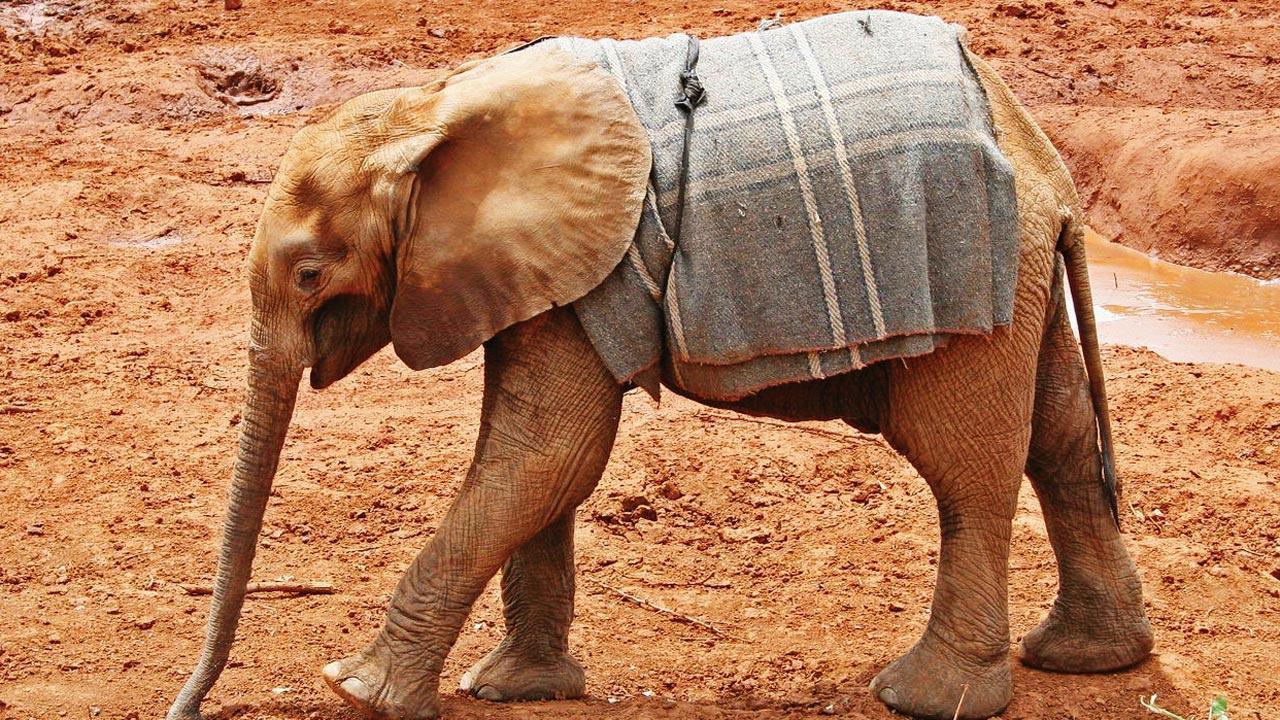A Mumbai-based canine behaviourist and groomer is remotely helping in the upkeep and fostering of the gentle giants who have long been a victim of human entertainment

An orphaned baby elephant shielded by a blanket in Nairobi
Growing up in Mumbai, Pooja Advani, canine behaviourist and founder of Doggiie Dog World, a pet wellness centre, recalls how it was common to find elephants painted in bright colours, trekking amid heavy traffic with their mahouts collecting fruits or coins offered by passersbys. “As somebody who has cared for streeties since childhood, something about this spectacle didn’t feel right,” says Advani, who’d routinely bring home injured cats, dogs and birds and nurse them back to health. The animal lover later went to try multiple career options, only to revert to her biggest love: animal welfare. She’s now trained her lens on conservation, especially of rehabilitation of elephants from human slavery.
ADVERTISEMENT
Advani has adopted two elephants that are being rehabilitated in a wildlife reserve at the Sheldrick Elephant Orphanage in Nairobi, Kenya. The late Daphne Sheldrick founded the organisation in 1977 and has helped save hundreds of elephants and other animals, rehabilitating them and returning them to the wild. Advani is also remotely fostering two more elephants at The Wildlife Friends Foundation Thailand (WFFT) sanctuary, which rescues and rehabilitates abused, sick and discarded animals from the entertainment, tourism or industry, and even from wildlife trade. These animals are completely domesticated since a very a young age and do not have the skills to survive in the wild. . In 2018, Advani had raised R5 lakh through an online fundraising campaign towards the efforts of Wildlife SOS India to save a six-year-old, baby elephant that was in captivity and being “broken” to serve humans. “To get these wild animals to interact with humans, they are put through an extraordinarily cruel breaking process that renders them submissive to their human trainers. These surviving animals are wounded, hungry and isolated.
 Pooja Advani has also been feeding strays and rescuing and rehoming abandoned pets during the pandemic
Pooja Advani has also been feeding strays and rescuing and rehoming abandoned pets during the pandemic
Phajaan involves sending captive elephants to a ‘training’ enclosure, where they are truly broken—in mind, body and spirit,” she explains. To “train” elephants for the entertainment industry, young elephants are separated from their mothers and often abused with bamboo sticks spiked with nails to teach them to lift their feet.
As per estimates, close to 2,500 elephants in India are kept in captivity. Out of this, 1,687 are with private individuals, and the remaining with zoos, circuses and temples.
Although Advani is helping pay for the upkeep of the adopted elephants, she isn’t allowed to go there as a volunteer or interact personally with the animals as the idea is to reduce human interaction. “Many of the elephants come with a history of abuse. At David Sheldrick, only the handler is allowed to interact with the orphaned elephants as they are young and need comfort. This is exactly how I’d prefer it because they are maintaining the sanctity of wildlife, and not trying to humanise them just so that we can touch and play with them.” Thailand’s WFFT, too, has strict protocols about human contact.
“They don’t allow the volunteers in the enclosure, which are massive and the only reason some of these elephants are kept here is that they are in a vulnerable condition and won’t be able to survive in the wild. I do get detailed monthly updates about how the elephants are doing—their antics, their eating habits, rapport with the animals.” Advani’s fifth adopted elephant is in a permanent rehabilitation centre in South Africa. She has also conducted an awareness session in a school, educating people to not ride on elephant back.
“An elephant’s spine cannot support the weight of people and doing so, all day can lead to permanent spinal injury.”
2,500
Approximate number of elephants in captivity in India
What can you do to help?
. Do not visit elephant camps or tiger temples/petting zoos
. Support rescue and rehab centres
. Do not purchase animal souvenirs. When the buying stops, the killing stops too
. Adopt an orphan elephant, rhino or giraffe, offering life and hope to an animal in need. There are several legit organisations that offer the opportunity
 Subscribe today by clicking the link and stay updated with the latest news!" Click here!
Subscribe today by clicking the link and stay updated with the latest news!" Click here!







